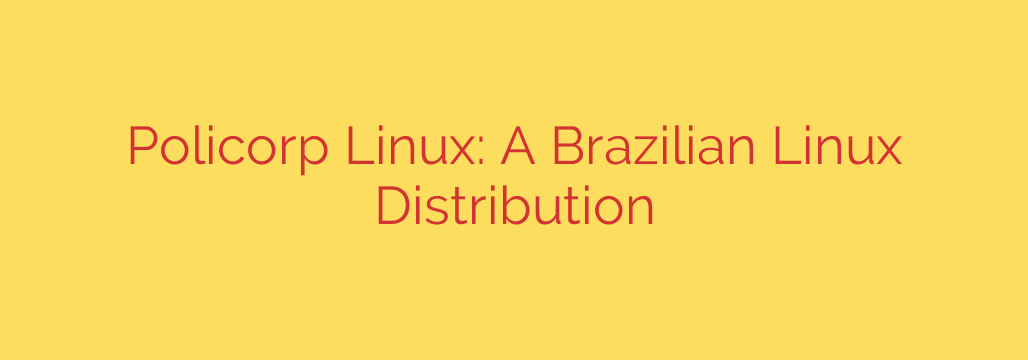
Policorp Linux: A Deep Dive into Brazil’s Custom Government OS
In the world of technology, governments are increasingly turning to open-source solutions to enhance security, reduce costs, and maintain digital sovereignty. A prime example of this trend is Policorp Linux, a specialized operating system developed for use within Brazilian government agencies, most notably the Federal Police. This isn’t your typical desktop Linux distribution; it’s a purpose-built platform designed for security, stability, and control in mission-critical environments.
While you won’t find it on a list of popular downloads, understanding Policorp Linux offers valuable insights into the strategic use of open-source software in the public sector.
What Exactly is Policorp Linux?
At its core, Policorp Linux is a customized operating system built upon the highly stable and secure foundation of Debian GNU/Linux. The choice of Debian is strategic; it is renowned for its rigorous testing, long-term support, and commitment to free and open-source principles.
Unlike general-purpose distributions like Ubuntu or Fedora, Policorp Linux is tailored specifically for the needs of government and law enforcement. This means it comes pre-configured with security policies, software, and system settings that align with the stringent requirements of public administration and national security. It is a tool designed from the ground up to provide a standardized, manageable, and highly secure computing environment for thousands of government employees.
Core Features of This Specialized Distribution
The strength of Policorp Linux lies not in flashy user interfaces but in its robust, under-the-hood features that prioritize function over form.
- Enhanced Security: The system is hardened out-of-the-box. This includes a locked-down kernel, strict access control policies, pre-configured firewalls, and integrated encryption tools. The goal is to minimize the attack surface and protect sensitive government data.
- Centralized Management: For any large organization, managing thousands of computers is a monumental task. Policorp Linux is built with tools that allow IT administrators to deploy updates, enforce security policies, and manage software remotely and efficiently across the entire network.
- Custom Software Suite: The distribution includes a curated set of applications required for government work, while removing unnecessary programs that could pose security risks. This could include secure communication clients, office productivity suites, and specialized forensic or administrative tools.
- Auditability and Transparency: By using an open-source base like Debian, the government can fully audit the source code to ensure there are no hidden backdoors or vulnerabilities. This level of transparency is impossible to achieve with proprietary, closed-source operating systems.
- Stability and Reliability: In a government or law enforcement setting, system downtime is not an option. By leveraging Debian’s “stable” branch, Policorp Linux ensures that the system is exceptionally reliable and free from the bugs that can plague more cutting-edge distributions.
Why Build a Custom OS? The Strategic Advantage
Some might ask why a government would invest resources in developing its own OS instead of using a commercial product like Windows. The reasoning is rooted in several key strategic benefits:
- Digital Sovereignty: Relying on foreign, proprietary software can create dependencies that pose a national security risk. A custom, open-source OS ensures the country has full control over its critical digital infrastructure.
- Cost-Effectiveness: Licensing fees for proprietary operating systems and software for thousands of government machines can be astronomical. An open-source solution eliminates these costs, freeing up public funds for other priorities.
- Complete Customization: A custom distribution allows for total control over every aspect of the operating system, from the boot screen to the most granular security settings, ensuring it perfectly fits the organization’s needs.
- Avoiding Vendor Lock-In: Using open-source software prevents a situation where the government is tied to a single vendor’s ecosystem, pricing, and product roadmap.
Security Lessons for Everyone
While you may never use Policorp Linux, the principles behind its design offer valuable security advice for any computer user, from home enthusiasts to small business owners.
- Start with a Stable Foundation: Whether you use Linux, Windows, or macOS, stick to long-term support (LTS) or stable versions of the operating system. These versions are better tested and receive security updates for longer periods.
- Practice the Principle of Least Privilege: Don’t use an administrator account for daily tasks. Create a standard user account for web browsing and email to limit the damage a potential malware infection can cause.
- Curate Your Software: Only install applications from trusted sources that you actually need. Every program installed is a potential entry point for an attacker. Regularly uninstall software you no longer use.
- Keep Your System Updated: The centralized management of Policorp Linux ensures all machines get security patches promptly. You can do the same by enabling automatic updates on your own devices to protect yourself from known vulnerabilities.
Ultimately, Policorp Linux is more than just a Brazilian Linux distribution. It represents a growing global movement toward secure, transparent, and sovereign digital infrastructure, with lessons in stability and security that can benefit us all.
Source: https://www.linuxlinks.com/policorp-linux-distribution/








